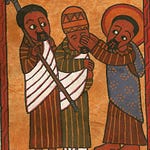Let’s recap the story so far. Jacob and Esau are born to Rebekah and her husband Isaac, the second Son of Abraham. Isaac loved Esau because of what he could offer him. Rebekah loved Jacob because of nothing but God’s promise to her. Jacob coerces his older brother, who is on the brink of death by starvation into selling his birth right for a bowl of lentil stew. Jacob’s mother, Rebekah, then devises a scheme to deceive her blind and ailing husband into giving her favourite son Jacob, her older son Esau’s inheritance and blessing – because, as the younger son, Jacob was not entitled to them. Isaac and Esau soon learn of Jacob’s deception. Esau vows to kill his younger brother, and Jacob, at the behest of his mother, does a runner and heads towards the land of Haran where his uncle Laban lives. On the journey, exhausted from running, Jacob stops to sleep and, in a dream, receives a vision from God of a stairway coming down from heaven with angels ascending and descending on it (spoiler alert, the stairway is Jesus). When Jacob arrives in Haran, he meets his cousin Rachel who he thinks is a smokin’ hot babe. He decides he wants to marry her and agrees to work for his future father-in-law/uncle for 7 years to do so. But, the deceiver soon becomes the deceived and on the wedding night Laban, in a reversal of Jacob’s deception of his father, tricks Jacob into marrying Leah – Laban’s older daughter. Laban, in full profiteering mode, says that in order to actually marry his beloved Rachel, Jacob must work for him for another 7 years. And the women are not safe from sibling rivalry in this game – we have sisterly as well as brotherly strife! Leah resents Rachel because of Jacob’s adoration of her. But Rachel resents Leah because Leah gave to Jacob multiple sons when she herself could not initially conceive. At this point in the story, Jacob has become a submissive stud in a story of two sisters trying to one-up each other. Eventually, between Leah, Rachel and their two respective maid servants Zilpah and Bilhah, Jacob fathers 12 sons and a daughter. By more deceit and much to the contempt of Laban’s own sons, Jacob prospers in the land of Haran whilst working for his father-in-law all those twenty years. Then God tells Jacob, like his Grandfather Abraham before Him, to go from Haran back to the land Canaan. Fearing more trickery from Laban, Jacob and his wives conspire to leave under cover of darkness – which leads us to our passage today.
This is one dysfunctional family. It reads more like a soap-opera than anything else. It begs the question, why does God bother with this bunch of squabbling tricksters? Surely there are better people to execute your purpose and plan than this lot? In fact, they’re worse than just deceivers, they are idolaters. Can anyone tell me the first commandment? Jacob and his disgruntled wives hatch a plan to abandon wicked Laban. So, while Laban is out tending to his flock, Rachel – the younger sister – sneaks into his tent and pockets his teraphim (Heb. “Household gods”). Now this isn’t the only place where teraphim show up in the Bible, and there’s a lot of conjecture about what they were exactly. In 1 Samuel in another escape plan involving another dysfunctional family and another angry Father-in-law, David’s wife, Michal the daughter of King Saul, puts a goat-hair wig (that should sound familiar) on a teraphim and puts it in David’s bed to make Saul’s men think David was asleep there. It’s probably the first instance of someone stuffing their bed with pillows to fool their parents so they could sneak out. The prophets Hosea and Ezekiel mention teraphim in terms of divination. In King Josiah’s reform they are outlawed. And in Zechariah they are said to “utter nonsense”, they “lie”, they give “false dreams” and “empty consolations…”
So why does Rachel pocket these gods? Again, there’s a lot of conjecture. Is it because the teraphim were used for divination – trying to work out what will happen in the future? Is she taking her father’s gods so he cannot use them to magically-ascertain her whereabouts? Or so that she can predict her own future? Or both? Or were the teraphim a symbol of one’s standing as the head of the family clan? If so, by stealing them is Rachel then claiming the inheritance her father has squandered? After all, one thing both her and Leah agree on is that their father no longer has any regard for them. Or is it because in keeping with Ancient Mesopotamian custom, these teraphim would also be taken on long journeys to ensure one’s safe passage – I think this is what’s likely. The teraphim allowed you to purchase a degree of safety, security, peace, serenity, predictability, luck, empowerment, hope, convenience, well-being, or even liberation, forgiveness, and relief from guilt.
Whichever it is, it’s not by mistake that she takes them. Rachel’s theft of her father’s gods is deliberate. Idolatry is not an accident. It’s not as though some of us can mistakenly land on the wrong candidate for god – woops. Idolatry is never an accident, it’s always a choice. And it’s not always an insidious choice. It might be a well be a choice in pursuit of a good outcome, like if I told you that the God in your pocket could stop the violence in Gaza, is there really no chance you’d not have taken it? This begs the question of us – who are the gods in your pocket?
Now it’s easy just to think of all the classic western vices when we think about idolatry; money, sex, and power. And we might think of these things for good reason. Jesus didn’t talk directly of sex per se, but he did talk a lot about marriage. He had some pretty harsh words to say about abuses of power (as did Paul and all the Hebrew prophets). And roughly 15% of Jesus preaching was about money, and that’s only the direct references. In one spectacular account, Jesus is asked about whether or not the Jewish people, in an act of civil disobedience, should defy their Roman overlords by not paying taxes to Caesar. Money and power often go hand in hand. And he asks for a coin before replying to his questioners, “Give to Caesar what is Caesar’s, and to God what is God’s” – whichever way you look at it, Jesus is saying your money is not yours, and everything belongs to God. But it’s also really easy to overlook a crucial detail here. Jesus has to ask for a coin… because His pockets are empty. Who are the gods in your pocket?
Idolatry is a symptom of Sin. Sin is not just something we do, it’s a cosmic power that bends us in on ourselves, blinding us to God and one another and binding us to death. Theologian Willie James Jennings put it like this: “idols come into existence in the space created by our turning away from one another as men and women as well as our turning away from God. Idols live between us, facilitating distorted desire and distorting relationship.” Idolatry causes a rifts between not just ourselves and God, but also with each other. It’s a much bigger but much more inconspicuous problem than just money, sex, and power. Idolatry often comes in familiar disguises. The Swiss theologian Karl Barth said that idolatry happens whenever we attempt to use the divine for our own ends. Idolatry happens when in “God’s name” we bless and baptise our own bias and prejudice. Idolatry happens when we stamp the so-called divine seal of absolute approval on our politics, or our denomination, or our theology. Idolatry happens when we use “God” to sanction our social-standing, our power, and our culture as superior over others. Idolatry happens when we confuse God’s will and desire for our own. Barth wrote, “One can not speak of God simply by speaking of humanity in a loud voice.” Idolatry happens when we attempt to get out of God anything – even a good thing – other than God Himself. Who are the gods in your pocket?
Karl Barth was writing this in 1934, at a time when the German church under National Socialism claimed God’s approval of Nazi racism and hatred of the Jews. He rightly accused the theologians of his day of replacing the true God with an idol they had created in their minds. Even our Holy Scriptures are not free from becoming idols. The Ku Klux Klan, many of whom are committed Christians, use the Bible to justify their beliefs. The slave traders, again many of whom were faithful Bible-believing Christians, used “the word of God” to ratify their actions.
The Bible never denies the power of idols to bestow benefits on those who worship them. All throughout scripture, the people of God in both old and new testaments continually relapse into idolatry, whether it is in their worship of Baal on Mount Carmel, or the Galatians preference for the false teachers over Paul, and don’t bother getting started on those Corinthians. It’s the same for us today. Fringe political organisations on the left and right, if you’re a “leaver” or a “remainer”, or a climate activist, or you’re a flat-earther, or a philanthropist, or part of an online hate group – these things all give their adherents a sense of meaning and purpose that they don’t find in the church. Scripture does not deny that the worship of idols has its benefits, it just insists that it is false. Who are the gods in your pocket?
You can pocket any number of gods that will promise you joy, peace, calm, hope, and well-being. They may make you feel forgiven, or enlightened, or inspired, they may numb your pain, or make you feel like your worth it, or your enough. If the church was the only place where people could find a sense of purpose and forgiveness each one would be bursting at the seams every week. Don’t get me wrong, the Gospel too can and does offer all these things, in fact, it offers them in pure and true abundance, but that’s not what it’s about. The Gospel is certainly not about benefits, the Gospel is not even primarily about forgiveness. The Gospel is first and foremost about loving communion with the creator through Christ, which has been God’s plan all along. Jesus has never been plan-B, he was always plan-A.
I asked the question earlier, “why does God bother with us?” It’s not as if we’ve morally progressed leaps and bounds since Jacob and his dysfunctional family stalked the dusty environs of ancient Mesopotamia. If anything, recent history, and our present-day war-torn reality, has shown that human beings are just as corruptible (if not more so) than ever. Well, the only answer that we have to the question, “Why does God bother with us?” is love. God loves us. God loves you. And the only reason we can say that with any degree of confidence is not because of anything we do or any qualities we possess, but because God has told us in the person of His word, Jesus Christ, God’s plan-A is that even while we were bound to Sin, He died for us.
Who are the gods in your pocket?
False gods all promise some benefit. The true God promises all of Himself. All of himself, no more, no less. All of Himself without reservation, without condition, that’s how much he loves you, that’s how much He desires you.
The Gospel is about God’s desire to be with us, to commune with us. It’s about God’s desire to have us, despite our squabbling, despite our deceptions, despite our idolatry, despite our unrepentant and hardened hearts. That is grace, God’s gift of his whole self to us in the person of Jesus.
Grace happens when our preferences for power, status, and wealth, are undermined by the creator God who became a vulnerable baby. Grace happens when God decides that He will empty Himself out for sinners upon that cursed tree. Grace happens when God drags us out of the tomb with Him. Grace happens when God decided that He intends to steal us away from the tent of Sin and death.
For you are the goods in God’s pocket.
Amen.






















Who are the gods in your pocket?